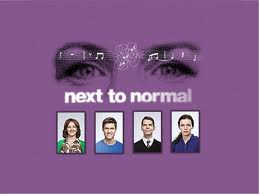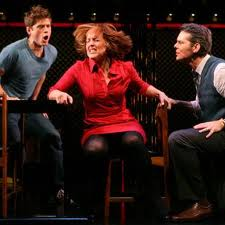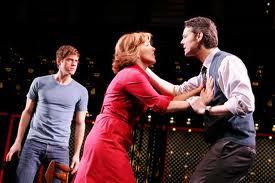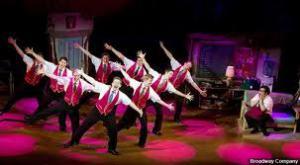For some poor, unfortunate individuals, musical theatre is the audible equivalent of fingernails upon a blackboard. They perceive it as a trite, pointless art form. The goal of this regular feature is to introduce readers to worthy, quality contributions to the musical theatre genre in the hopes of increasing the art form’s appreciation.
When Next to Normal came to Broadway in 2009, it was one of the few musicals of the last ten years with no celebrities, no prior source material, and an unestablished songwriting team. Lyricist Brian Yorkey had no Broadway credits to his name, and composer Tom Kitt had only the flop movie-to-musical adaptation High Fidelity. Moreover, it featured an incredibly non-traditional story line about a bipolar mother named Diana and the effects her mental illness has on her family, a husband and a daughter. We’re not talking ha-ha bipolar, ala the recent film Silver Linings Playbook. We’re talking electro-shock therapy territory here.
So, obviously the show was critically praised and financially successful. Okay, that wasn’t obvious at all. It was the surprise hit of the season in 2009, earning a Tony nomination for Best Musical. It is one of modern Broadway’s most impressive musicals and warrants further analysis.

Shiny, Happy People (Read: Dark, Depressed People)
SPOILER ALERT BELOW!
The moment I want to showcase comes from the Act I midpoint, immediately after the biggest spoiler the musical has to offer: Gabe, the son with whom we have seen Diana interacting, is the hallucination of a son who died when he was several months old. She imagines him at the age he would be had he survived– about 18 yrs. We’ve been as suckered into Diana’s madness as she has been. It’s the Broadway musical equivalent of watching The 6th Sense for the first time and being stunned when Bruce Willis turned out to be a ghost.
Diana’s husband, Dan, attempts to force her to confront her mental illness. She has stopped taking her medications, feeling they are simply masking her emotions rather than allowing her to cope with them. However, she is defiant in her opposition to Dan, claiming he cannot understand how she feels. He tries to convince her that all he want is to help her, while the hallucination of Gabe re-emerges and attempts to lure her deeper into her madness. She retreats from her husband and takes comfort in her delusions.
So, basically on one shoulder Diana has an angel telling her to get a grip, and on the other she has a devil who looks like her long-since dead son. What to do, what to do.

I like to think this is how every night ends for this family.
Check out the song in the link below from the show’s Tony Awards performance featuring the original cast members Alice Ripley as Diana, J. Robert Spencer as Dan, and Aaron Tveit as Gabe:
I love the conflict in the song. The first half, “You Don’t Know,” presents Diana trying to explain to Dan how suffocated and desperate she feels in her mental illness. His desire for her to just bury the past, as he has had to do, manifests in his desire for her to simply take her medications and remain numb to life. He cannot understand why she hates feeling so numb because it has long since been his status quo. Coping with Diana’s issues leave no time for his own emotional pain, and he spends most of the play slowly erasing himself. While she rages, Dan remains silent, until she forces him to stop and really look at her. Only then, does he confront her, but his words are aggressive and desperate because he has no idea how to approach her.

“What do you mean, you can’t get over our dead son? Snap out of it! It’s not like you’re being haunted by a hallucination of him every day or anything!”
In addition, I love how alluring Gabe’s vocals seem in contrast to Dan’s. Gabe’s lines sung to his mother are soft, comforting, and the notes practically flow into one another. Dan’s lines directed at Diana are harsh, angry, and confrontational. These contrasting styles represent the differences between Diana’s delusions and reality. In her delusions, she has this perfect son who is everything she ever imagined him to be (mainly because she has, in fact, imagined him). This world is warm, comforting, and absent of any emotional trauma. The reality Dan promises, however, is cold and harsh. Her son is dead there, and her daughter (who is real, by the way) has emotional issues of her own and is drifting farther and farther from her grasp. Reality has all of the emotional trauma and difficulties she wishes to escape. At the song’s end, she cannot return to that world. Instead, she seeks solace in her hallucinations, while Dan can only stand by feeling helpless. It’s a powerful, devastating moment.

Let’s be honest here. Who looks more comforting?
Next to Normal’s cast recording is available to purchase on CD or iTunes. It’s an amazing cast recording that I recommend highly.
What Next to Normal Means to the State of Broadway
The twenty-first century has been a difficult time for musical theatre. Ticket sales are driven more by name-recognition, be it the name of the show (a revival of a classic or an adapation of a well-known film) or the celebrities listed on the marquee. With musicals becoming more and more costly, investors want some assurance their money will return to them (hopefully after being fruitful and multiplying), and familiarity is an easy thing to demand. As a result, there is very little room for original musicals.
Book of Mormon was widely praised for its tuneful score and outrageously, politically incorrect sense of humor. Many critics took note of the fact that it wasn’t a revival, nor was it based on a previously released movie, play, television series, composer’s catalogue, or whatever (Could McDonald’s!: The Musical be far behind?). However, it was promoted as the musical from Trey Parker and Matt Stone, the guys who made South Park. So, while it was an original show (and the music is fantastic and hilarious– I promise I’m not knocking it), it was hardly some upstart musical by a little-known composer. Musicals of that variety are few and far-between in the current Broadway world.

Quite a shocker that this paid off, huh?
I’m not trying to criticize every musical adaptation or revival. Many of them are fantastic (and they have the Tony Awards to prove it), but it is more difficult to find the next Stephen Sondheim or Stephen Schwartz (or even a composer not named Stephen) when so few commercial risks are being taken. Next to Normal was a commercial risk that paid off, closing on Broadway after a healthy run of 733 performances. I’m not trying to take your Newsies or Jersey Boys away, as I am a big fan of those shows myself. I’m just saying let’s leave a little room for the Next to Normals out there as well.
So, what do you think, guys? Do you think this a Broadway moment worthy of coverage? Is there a Broadway moment you think we should have done instead? Let us know in the comments!

